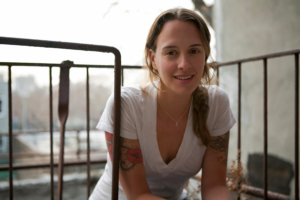 For years, conversation about the changing ways we take in information has been characterized by polemics and a general sense of doom: Is Google making us stupid? Is Facebook making us narcissists? We keep trying to pinpoint what, exactly, is changing, because something surely is. But rather than strategize about how to wage war on distraction, or rebuild dissolved attention spans, Full Stop has decided to jump out of our poorly constructed lifeboat and wallow in the vast and undulating sea of information. With this questionnaire, we would like to explore, yes, how the internet is changing the ways in which we create, curate, and consume information (be it in the form of fiction, non-fiction, or criticism) but with an eye open for the pockets of potential in such changes.
For years, conversation about the changing ways we take in information has been characterized by polemics and a general sense of doom: Is Google making us stupid? Is Facebook making us narcissists? We keep trying to pinpoint what, exactly, is changing, because something surely is. But rather than strategize about how to wage war on distraction, or rebuild dissolved attention spans, Full Stop has decided to jump out of our poorly constructed lifeboat and wallow in the vast and undulating sea of information. With this questionnaire, we would like to explore, yes, how the internet is changing the ways in which we create, curate, and consume information (be it in the form of fiction, non-fiction, or criticism) but with an eye open for the pockets of potential in such changes.
Emily Gould is the co-founder of Emily Books and the author of the memoir And the Heart Says Whatever. Her new novel, Friendship, will be released this summer.
Where does the most interesting (innovative in form and content) writing find its home right now?
I think it’s been a great year for the very long and very short. In addition to the shortish books that are my bread and butter (most Emily Books picks are around 200 pages), I have loved immersing myself in three very thick, purely fun books this year. Mainstream publishing is getting great at producing guiltless pleasure novels: well-written but not particularly taxing, propulsively plotted books that you read compulsively for three days and then, truthfully, sort of forget, like a bingewatched TV series: Life After Life, The Goldfinch and Hild are the ones I’m thinking of and if you haven’t read them yet, treat yourself. I have also loved being addicted to Twitter. I love participating in jokes and conversations and sharing my enthusiasms there, and I have loved reading and communing with my fellow addicts.
Today, we’re flooded with stories via the internet — on personal Tumblrs, Facebook and Twitter statuses, the abundance of magazines and newspapers that make their content free online. With so many narratives all around us, why do we still read (and pay for) novels?
Just speaking for myself, if I’m not in the middle of an engrossing novel I tend to feel like something’s wrong in my brain. I get anxious and distracted and forget what the point of life is supposed to be.
What do you think is good about the way we interact with information today? How has your internet consumption changed your brain, and writing, for the better?
I’ve said before that I love the mediated intimacy of the internet, and the way it enables an aspect of me to have a relationship with aspects of a lot of other people. Those relationships are precious to me and they are “real.” I have a collaborative streak that solitary writing doesn’t always scratch, and the editorial process can sometimes feel like having the world’s most agonizingly slow-mo conversation. Zinging references and insults and sharing ideas back and forth over Twitter enables me to flex some brain-muscles, while it certainly enables others to atrophy. I think it’s changed my brain for better and worse. I don’t know whether my Internet consumption has changed my writing overall, but I do turn everything off as much as possible for as many days in a row as I can when I’m trying to write new pages.
How is quality writing on the internet facilitated? How is the role of an online editor different than that of an editor for print?
I learned how to edit blog posts from Choire Sicha. Basically you put the most interesting thing in the first sentence and break up long paragraphs and add some exclamation points. But that’s decent advice for non-online writing, too.
The internet makes possible new forms of collaboration and discussion. How has this changed the concept of authorship online?
I like that it’s clearer than ever that sometimes a lot of people have the same idea at the same time, because we can watch it happening in real time. I also like that more people are writing than ever before, and that being an author is not considered as rarefied. As a feminist I think this is important; I’m happy that more people are feeling empowered to create the media and the novels they want to read.
This post may contain affiliate links.








